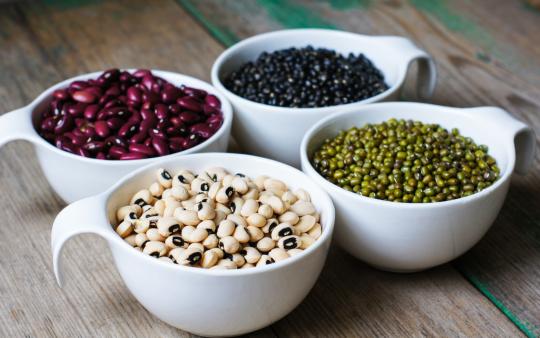Macrobiotics, as it's called today, is a philosophy that was founded by Japanese philosopher George Ohsawa in the 1920s. While it is often discussed as a diet since the mid-twentieth century, macrobiotics – from the Greek macro (big) and biotic (concerning life), meaning "the big view of life" – is a system of holistic principles intended to guide choices in nutrition and lifestyle for personal, social and environmental health. Rooted in Zen Buddhism, which has been practiced for over a thousand years in China, Korea, Vietnam, and Japan, a macrobiotic way of life is based on an understanding of nature's underlying unity and a practical way of living towards happiness and harmony.
You can replicate the health benefits of a traditional Japanese diet by incorporating lots of fermented foods, rice, soybeans, whole grains, fresh fruits, vegetables and teas like matcha into your diet. Consistent daily meals of these ingredients – which can be purchased online – coupled with regular sleep and daily exercise are known to promote mental and physical health.
How Can A Traditional Macrobiotic Diet Help Your Health?
According to the WHO, Japan has the highest average life expectancy and the greatest proportion of centenarians worldwide. The current life expectancy for Japan is 85, compared to 78 in the United States. Researchers attribute this primarily to their diet, which consists of lean and balanced foods low in saturated fats, sugars, and rich in vitamins, minerals, probiotics, and omega-3s, reducing the risk of obesity, cancer, and heart disease. A traditional Japanese diet consists mostly of plant-based foods, fish, seaweed, soybean, and green tea, providing ample fibre and many other benefits associated with well-being and longevity.
By contrast, the typical modern "Western" diet – or that most prevalent in North America and Western Europe – is built on saturated fats, salt, processed foods, and refined sugars. This diet is harmful to the body in many ways but notably leads to dangerously low dietary fiber intake. Evidence suggests that consuming plenty of fiber is associated with a lower risk of heart disease, stroke, type two diabetes, and bowel cancer. Foods with fiber (like Kamut or Millet) will also help us feel fuller after eating smaller portions. Unfortunately, according to the Canadian Digestive Health Foundation, most Canadians are only getting half as much fiber as they need.
For those reasons, Ohsawa's macrobiotic diet was popularized in the West in the '60s and 70's. Yet, it is not a new concept to those eating a diet with lots of legumes, fruits, seaweed, seafood, seasonings, and spices for centuries. For some, though, macrobiotics would be a noticeable change as it includes less high-heat cooking in oil, and fermented condiments instead of salt and sugar. As well, the diet requires cutting down on eggs, dairy, and meat.
This diet isn't all about what you should refrain from eating, though. Yes, Macrobiotics is low in sugar, salt and processed food, but it is high in fruit, vegetables, whole grains and fish. It is also predicated on a greater variety of ingredients than 'allowed' in other diets. Keep reading to learn how you can incorporate some of these time-tested dietary practices for greater health and longevity.
How can you follow a Macrobiotic diet at home?
To follow a Macrobiotic Diet, follow this ratio in your daily diet:
- Around 40-60% of your food: whole grains such as brown rice, barley, oats, buckwheat
- Around 20-30% of your food: fruits and vegetables
- Around 10%-25% of your food: beans or bean products including tofu, miso and tempeh or sea vegetables such as Kombu or Nori
All of the grains involved are whole grains. and there is much less meat than a standard North American food pyramid. However, ingredients like beans and tofu will add a great deal of creativity in your kitchen, like this Aduki Bean Soup or Creamy Tofu Dressing.
If you're wondering where to access these foods (which may be harder to find naturally-sourced in Canada or the United States), you don't have to look too far: Eden Foods – the oldest natural and organic food purveyor in North America – carries an artisanal line of miso, soy sauces, noodles, seasonings and sea vegetables that are high in fibre but low in preservatives. You can find a full range of their macrobiotic offerings here, while also supporting an independent business.
Take a Holistic Approach to Nutrition
The macrobiotic philosophy should be considered holistically. If you are interested in the macrobiotic philosophy, not only should you be eating healthy, you should be mindful of living in a healthier way – a way that treats yourself and the environment better. The seven conditions of health, according to the George Ohsawa Macrobiotic Foundation, are:
- Vitality
- Good appetite for natural food and life
- Deep refreshing sleep
- Good memory
- Cheerful, pleasant outlook
- Clear thought and action
- Honesty and appreciation
The traditional Japanese approach to meals is holistic and aims for healthy eating habits plus a variety of nutritious foods. In addition to adding new foods into your diet, you can also shift the way you eat to follow the principles of macrobiotic philosophy more closely.
Everybody benefits from eating slowly, mindfully and in smaller portions. You can do this by following a traditional Ichiju Sansai regimen for Japanese cuisine (named by UNESCO an item of 'Intangible Cultural Heritage'), which involves a soup and three sides. In fact, ichi means one and ju means soup; san is three and sai refers to dishes, so ichiju-sansai literally translates to, "one soup, three dishes." The soup is often miso soup, but you can select another clear soup option as you like. Pickles and rice are almost always served on the side, too, but the dishes can rotate based on what's in season and what your mood calls for.
This style of meal helps incorporate a variety of vegetables and proteins into your diet, without relying too much on just one thing. You can find ingredients for a traditional-style Ichiju Sansai feast like miso paste, sea vegetables, mushrooms, soy sauce, tofu, and rice at Eden Foods' online store based in Michigan, U.S.A. You can find loads more healthy recipes that incorporate a macrobiotic way of life on the Eden Foods site. Hopefully, you'll begin noticing improvements in mealtime mindfulness in the meanwhile.
You may also enjoy: Soba Noodle Bowl Recipe, Secrets of the Japanese Diet for Health and Longevity, and the Benefits of Matcha, Plus how to find the healthiest kind.

Founded in 1968, Eden Foods is the oldest principled independent organic food company in the United States. Its mission is Creation and Maintenance of Purity in Food. Eden brand is the authentic alternative to commercial food; the purest, best tasting grains, beans, and vegetables on the planet, from known trusted growers. Healthy soil, long-term organic, non-GMO.







